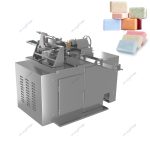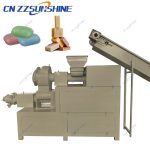Streamlining soap manufacturing requires precision-engineered systems. An automatic soap production line integrates specialized machinery to handle mixing, refining, shaping, and cutting—eliminating manual bottlenecks. Central to the process is the soap mixer, which ensures uniform blending of oils, lye, and additives under controlled conditions. The blended paste then moves to a vacuum plodder, where air pockets are removed under pressure to create a dense, homogenous extrusion. This step is critical for producing high-quality bar soaps, whether for laundry or toilet applications.
For consistent sizing, an electric washing soap cutter precisely segments extruded logs into bars. Custom soap cutting machines can be adjusted for varied dimensions, accommodating niche markets like beauty soap making lines. Downstream, a toilet soap finishing line polishes and stamps each bar, while laundry bar soap production lines may incorporate rapid-cooling systems. The entire sequence—from the soap plodder machine for bar soap to packaging—operates seamlessly via PLC controls, reducing labor costs by up to 60%.
Key advantages include scalability and flexibility. Modular designs allow integration of bath soap making machines or three-roller mills for cosmetics-grade formulations. Reputable suppliers offer OEM configurations, adapting plodders or mixers for specific throughputs. With minimal downtime between batches, facilities achieve 24/7 operation. For factories prioritizing hygiene, stainless-steel contact parts and automated CIP (clean-in-place) systems maintain compliance.
Investing in a turnkey automatic soap production line slashes per-unit costs and ensures product consistency. Brands targeting export markets particularly benefit from standardized outputs that meet international certifications. By automating refining and cutting stages, manufacturers can redirect resources toward R&D or sustainability initiatives, future-proofing operations in a competitive sector.





